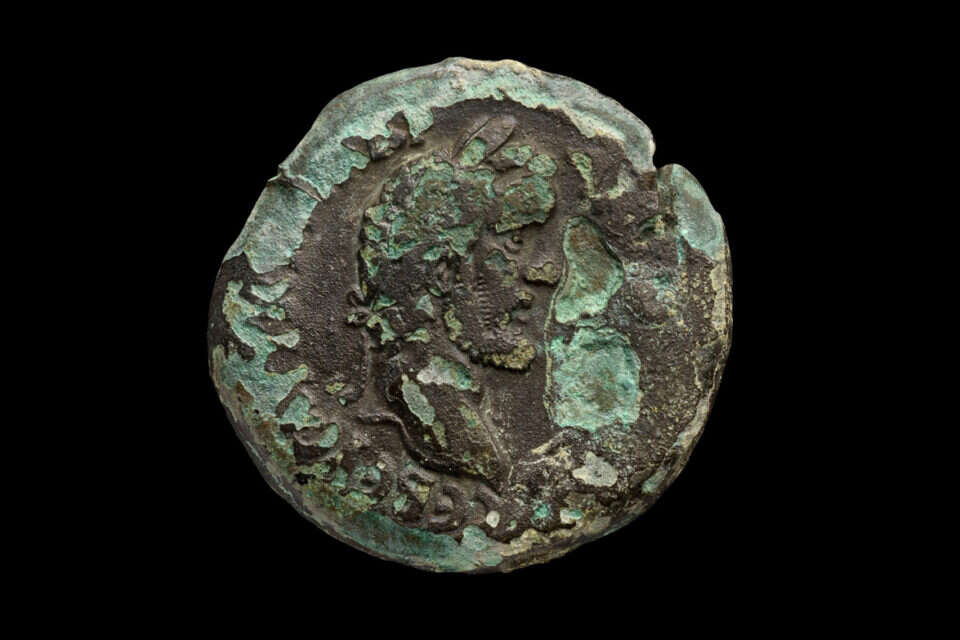A spectacular and rare coin, bearing the portrait of the Roman goddess of the moon Luna, was recently discovered on the Carmel beach in Haifa - the first time that such a coin has been discovered on an Israeli beach.
On the back of the coin, which is about 1,850 years old, depicts the sign of Cancer and the portrait of the Roman moon goddess Luna, and is part of the zodiac coin series.
This is a rare and spectacular bronze coin in an exceptional state of preservation, which was recently discovered on the seabed during an underwater archaeological survey conducted by the Maritime Antiquities Authority, which aims to save antiquities from accelerated development.
A rare sight.
The coin, photo: Yaniv Berman - Antiquities Authority
According to the authority, the coin, dating from the Roman period, was minted in the name of the emperor Antoninus Pius (138-161 AD), in Alexandria, Egypt, and the date "Year 8" appears on it - the eighth year of Pius' reign, around 145-144 AD.
The coin is part of a series of 13 coins in which the 12 different zodiac signs are depicted, as well as another coin in which the entire zodiac is depicted.
Yaakov Sharvit, Director of the Maritime Archeology Unit at the Antiquities Authority, emphasized: "This is the first time that such a coin has been discovered in the sea in Israel and it is rare in the state's treasures. Along the shores of the Mediterranean Sea in the State of Israel and in its maritime space, there are many archaeological sites and findings that tell of connections that existed here in ancient times between The ports of the Mediterranean Sea and the countries along it. These finds, which sank into the abyss and disappeared from human sight for hundreds and thousands of years, have been preserved in an amazing way, some of them are extremely rare, and their discovery completes parts of the historical puzzle of the country's history."
Describes Cancer.
The coin, photo: Yaniv Berman - Antiquities Authority
According to Eli Escozido, director of the Antiquities Authority, "In the last decade, Israel has been changing its perception of the sea. Now, it is already clear that the sea is not its border line, but a significant part for it, in terms of security, strategic, economic and also heritage. It is a space of natural treasures and cultural assets It must be explored and protected, in the face of the variety of interests and development potential. As part of this process, the marine survey was carried out in Haifa. The rare coin that was discovered during it is a spectacular reminder of the importance of the survey."
Emperor Antoninus Pius, who minted the coin, was a Roman emperor who ruled during the years 138-161.
Unlike his predecessors, he was not a military man and never participated in combat.
The period of his reign was the quietest in the entire period of the Roman Empire, which was the peak of Roman peace throughout the empire.
Antoninus' approach to running the Roman Empire was different in that he preferred to manage all foreign crises through provincial commissioners, which led to him not leaving Rome at all.
He encouraged and initiated the construction of temples, theaters, magnificent burial structures and promoted science and philosophy.
During his time, the emperor's relations with the Jews were greatly eased, Hadrian's decrees were canceled and the Jews were allowed to perform circumcision.
These concessions led to friendly ties between the emperor and Rabbi Yehuda Hanasi.
"A spectacular reminder of the importance of the survey."
The rare coin, photo: Yaniv Berman - Antiquities Authority
were we wrong
We will fix it!
If you found an error in the article, we would appreciate it if you shared it with us

